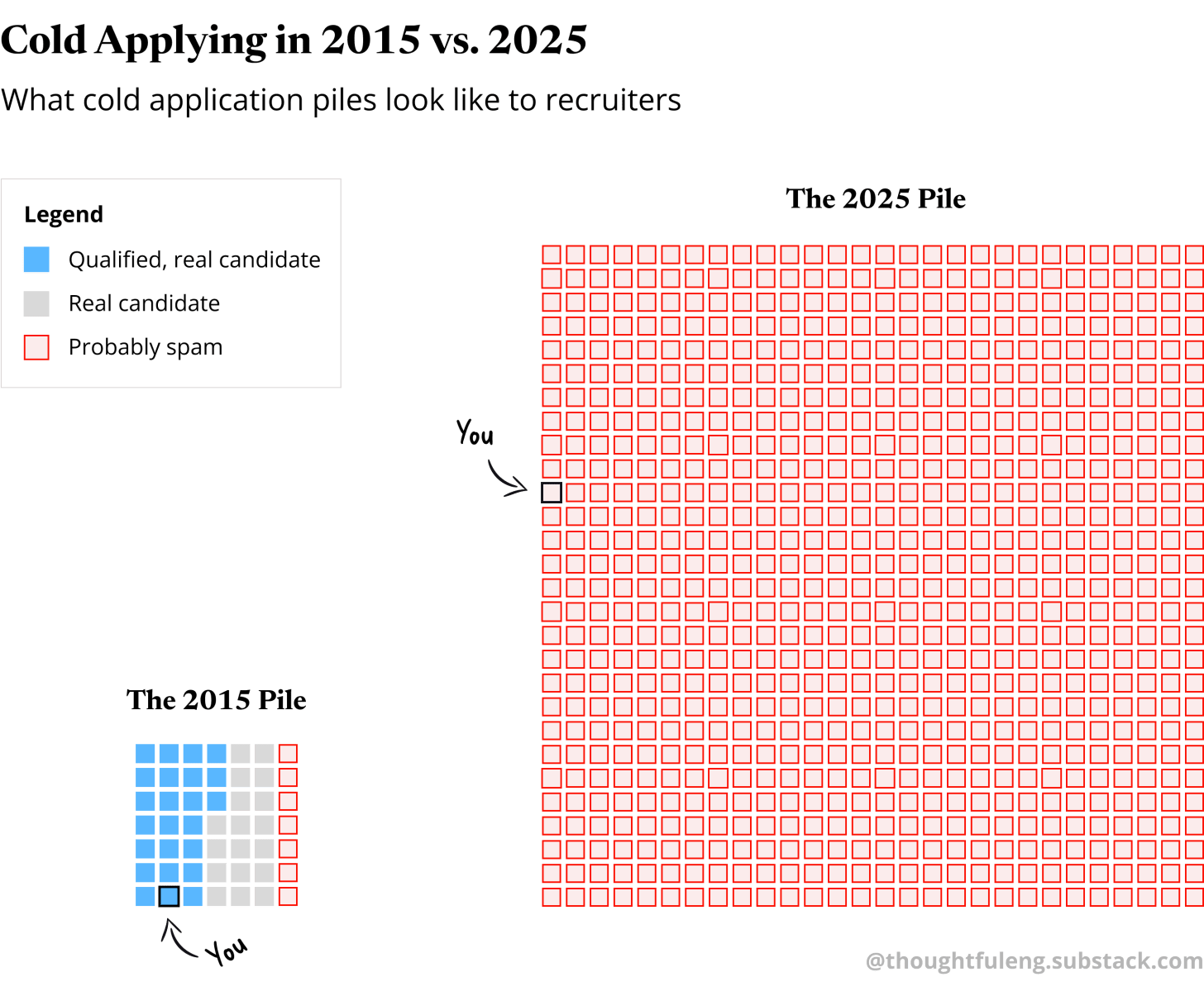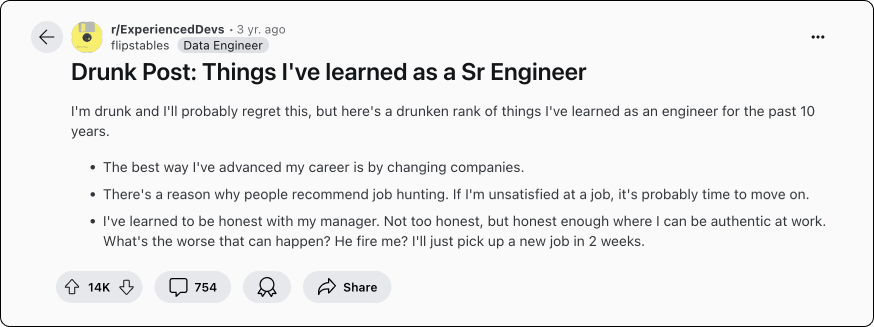In 2015, software engineers entered the job market with swagger.
The moment your LinkedIn status updated, recruiters would swarm. Any time you applied for a role, you could (reasonably) expect a response. Even happily employed engineers would be constantly solicited with job offers.
This went on for decades. There are engineers - well into their 40s - who have never experienced a ‘normal’ job hunt.
Then, circa 2023, a lot of things happened very quickly.
ZIRP (zero-interest rates) ended, bringing cost of capital back. Section 174 passed, eliminating R&D write-offs for engineering departments. Breakthrough AI technology promised untold productivity gains.
In response, Big Tech stopped hoarding talent and made steep cuts to optimize for cash. Almost overnight, bloated engineering budgets became relics of a bygone era.
These layoffs flooded the market with tens of thousands of technical job seekers. And these job seekers found themselves in completely unfamiliar territory.
For the first time, job hunting was a struggle.
News articles blame a weak job market or AI replacing developers. This narrative feels right, but doesn’t track with reality. AI hasn't truly replaced jobs, and the software engineering market is still growing—just slower.
So why are so many qualified, in-demand tech workers struggling? The answer:
The hiring process itself has fundamentally changed.
Pre-AI, you had to apply for jobs manually. A small company would be very, very lucky to receive 20+ truly qualified applicants for an open technical role.
Today, the minute a job is up, it’s swarmed by AI bots. Hiring managers -even at small companies - are inundated with thousands of applications.
“Some people are convinced that AI is taking over their job,” says Lucia Hoang, founding product leader at Scout, a talent matching network of 15k+ tech workers, “But anyone hiring today knows that the real problem is the AI spam cesspool.”
This cesspool is too large to screen properly. Arguably, it’s not worth screening at all. Is this candidate genuinely interested, or did a bot send their CV?

In response, hiring managers are rolling up their sleeves - showing up at events and tapping their networks to manually find trusted, qualified candidates. It’s more work than ever; some recruiters now spend 48 hours just to generate a single on-site.
Cold applications have become an afterthought…but no one gave candidates the memo:
Tech job seekers are still applying for jobs like it’s 2015.
Sending out cold applications
Believing that their work speaks for itself
Waiting for opportunities to come to them
Ironically, the candidates are often using AI too.
“Everyone is using the spray and pray method”, says Hoang, “It’s a known industry problem because it’s creating even more slop.”
Like all AI applied with bad fundamentals, it only amplifies failure. Candidates - used to feeling desired - are spending months sending hundreds, even thousands, of applications into the abyss.
Add social media, AI hype, and economic anxiety, and you have a cohort of talented engineers feeling demoralized and unemployable.
I’m not good enough.
I’m irrelevant.
I’m going to be replaced by AI.
I won’t be able to support my family.
The problem isn't them, the job market, or AI. It's their outdated playbook. A decade ago, engineers could wait for opportunities to come to them. Cold applications were taken as a sign of serious intent.
"I talk to candidates all the time who have spent 3 hours sending out 90 applications,” says Hoang, “that’s a waste of time. Instead, have three super meaningful coffee chats with people. You need to be more intentional and selective.
Hoang’s advice reflects the new normal:
In the face of high-volume AI slop: taste, intention, and trust are everything.
Be legible: Hiring managers want candidates with clear passion for their specific product/industry/role - not someone happy to take Any Generic Job™.
Go to IRL Events: Meet recruiters and founders in person. Don't show up "looking for a job”, but to make new friends. Be open, curious, and schedule follow-ups.
Ask your network for help: Reach out to former colleagues, friends, and bosses. Let them know you're looking and make it easy for others to refer you by painting a clear picture of what you want.
Post on LinkedIn: Many engineers have empty profiles—a massive missed opportunity. Use LinkedIn to start industry conversations, hype others up, and track who’s hiring (often before the job is even posted!).
Show up with good energy: Networking isn’t cringy or beneath you. People can sense when you arrive thinking "this is dumb”. Be kind, open, and focus on forging meaningful connections.
This might sound simple - even obvious - but in practice it’s brutally hard.
When you’re desperate, you’re willing to take everything
When you feel low, you don’t want to see anyone, let alone network.
When you feel unworthy, asking for help is the hardest thing.
When you feel like a failure, you don’t want to talk about yourself.
When you’re harsh on yourself, it’s hard to be kind to others.
A job hunt is grueling because you’re fighting your lizard brain’s strongest instincts at every turn. Be kind to yourself. The median job search takes 5 months; optimize for the long-run.
A sanity check: take yourself out of the equation and imagine a dear friend. Would you judge them for asking for help? Laugh at them for posting on LinkedIn? Advise them to take a job that doesn’t fit their interests/skills?
A job hunt is like dating…in hell. After months of vulnerability, you get constant rejection and ghosting wrapped in business-jargon:
“While we were all impressed with your skill set and knowledge…”
If you’re successful, you get to enter into a negotiation on your literal worth. Run out of time, and you might end up settling to make Mom happy.
All to say: doing it right is supposed to hurt. And for technical talent - who have only experienced this process as the dating equivalent of 6’5’’, blue-eyed finance guys with trust funds - it will literally feel like fresh hell.
This fresh pain isn’t a sign that YOU ARE BAD and THINGS ARE BAD. It’s just…the process. Trust in the process and trust in yourself.
Really: you will be okay. The fundamentals haven't changed. The tech job market is still growing. You are just as employable as you’ve always been.
But…you do need to approach the job search differently.
“A cautionary tale is the Ivy League/FAANG kid who feels entitled to success,” says Hoang, “They think they can get a job by virtue of being a Harvard grad or software engineer. Being in proximity to a strong network is not the same as having one.”
Be legible, show up with good energy, and be brave enough to ask. When in doubt, focus on building authentic, meaningful connections. Again:
In the face of high-volume AI slop: taste, intention, and trust are everything.
And for many candidates, it can be as simple as recognizing their pre-existing networks. Who did you enjoy working with? Who was your lunch buddy?
They don’t have to be in your immediate field - if you’re a data engineer, who in product or design or marketing did you have a good rapport with?
Make a list, and reach out to all of them.
You’ll find that most people are delighted to hear from old connections, catch up, and help if they can.
The job hunt will still suck. But once you're through it, you'll have something the 2015 engineers rarely did: a real network built on genuine relationships.
You didn't just find a job. You learned how to build a career.
For more insight on how insight on how AI is *actually* changing the software development landscape, give us a follow:
Thoughtful Engineering is not and will never be sponsored. This article wouldn’t have been possible without Scout’s insights on the hiring market. Scout is a candidate-first job platform that has matched thousands of candidates with taste, intention, and trust. If you’re looking, curious, or hiring, check them out.
.png)





